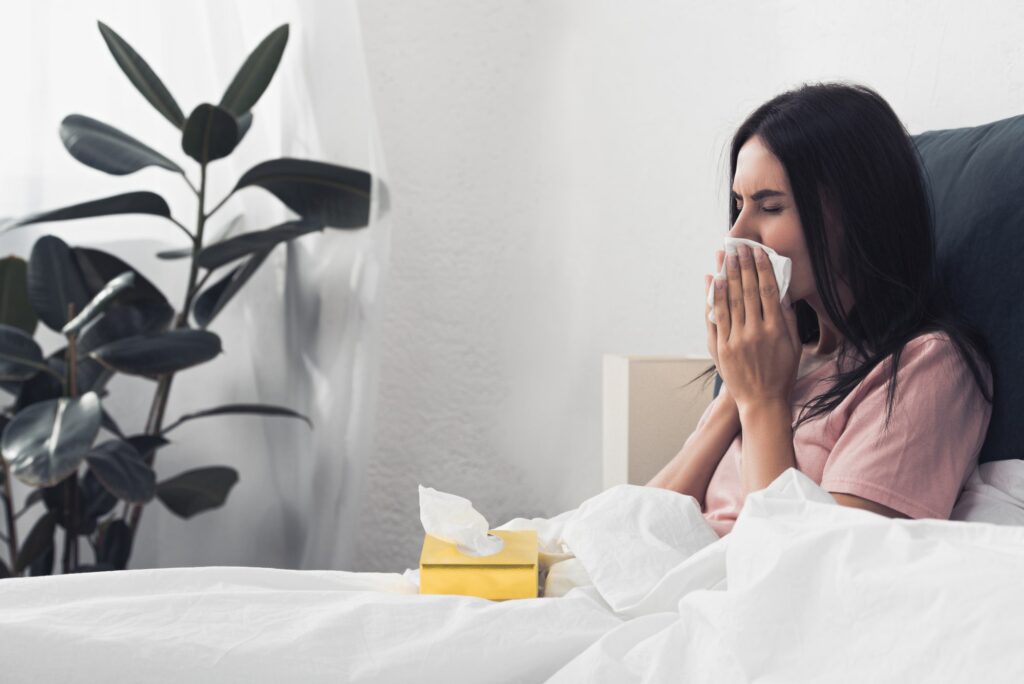Top tips for sleeping when you’re sick
When you’re not well, sleep is one of the best things you can do. Unfortunately, sleeping when you’re sick isn’t as easy as it sounds. Here is our best advice on how to get quality sleep to help you recover.

Sleep to recover
Sleeping when you’re sick is one of the best things you can do. This is because it helps boost your immune system so you can fight off the illness and recover. There are several ways sleep helps you to recover from illness:
- Cytokines (proteins that target infections) are produced and released during sleep
- Your body has a better fever response (another way of fighting infections) when you’re asleep
- Your body can direct all its energy to your immune system while sleeping, instead of directing some of it to help you perform activities such as moving and thinking while you’re awake.
How much extra sleep?
There is no hard and fast rule about how much sleep you need when you’re not well. But it’s quite common to sleep a lot during your first few days of illness. Listen to your body. If you feel like you need to sleep, do. Just make sure you eat healthy food to support your immune system and drink enough water when you’re awake.
Sleeping when you’re sick
Unfortunately, sleeping when you’re sick can be tricky. If you have a gastrointestinal illness for example, you’ll only be able to snatch brief moments of sleep, or doze lightly in between visits to the toilet. The good news is that these illnesses usually only last a day and once the bug is out of your system, you’ll be able to sleep pretty soundly and let your body recover.
However, if you’re sick with a cold or flu — which can last anywhere from 5 – 14 days, it’s important to get as much sleep as you can. The following tips may help:
- Use decongestants and cold and flu medications to help you breathe better. Be sure to use night-time preparations designed to help you sleep. Speak to your pharmacist about which product is best for you.
- Use a humidifier in your bedroom to help you breathe better, or a bowl of hot water with eucalyptus oil under your bed.
- Try sleeping with your head propped up higher than usual to help drain your nasal passages and reduce pressure in your head.
- A hot shower or bath before bed can help break up mucous as well as help you relax.
- Warm drinks of honey and lemon in water can help soothe a sore throat and relax you before bedtime. You could also try gargling with salt water.
- Choose chicken soup for dinner. Not only does the steam help clear your nasal passages and the broth soothe your throat and nourish your body, but research shows that chicken soup has anti-inflammatory properties that may help in easing cold symptoms.
- Avoid alcohol before bedtime as it can interfere with sleep.
- Don’t stress if you wake up in the night. Worrying about not getting enough sleep can make it harder for you to sleep.
- Make sure you keep tissues, water or even throat drops by your bed in case you need them during the night.
- If you can’t sleep enough during the night, don’t be afraid to take short naps of around 30 minutes during the day.
- Create a comfortable sleep environment. Your room should be cool, dark and quiet. Make sure your mattress is comfortable and you have multiple layers of blankets on your bed, rather than a single, heavy doona. This can help make sure you don’t get too hot or too cold.
Let us help
While we can’t prevent you from the ills and chills that life throws your way, we can help by ensuring that you have a comfortable mattress to sleep on. Our friendly staff are ready to help so feel free to come in-store or browse online today.





